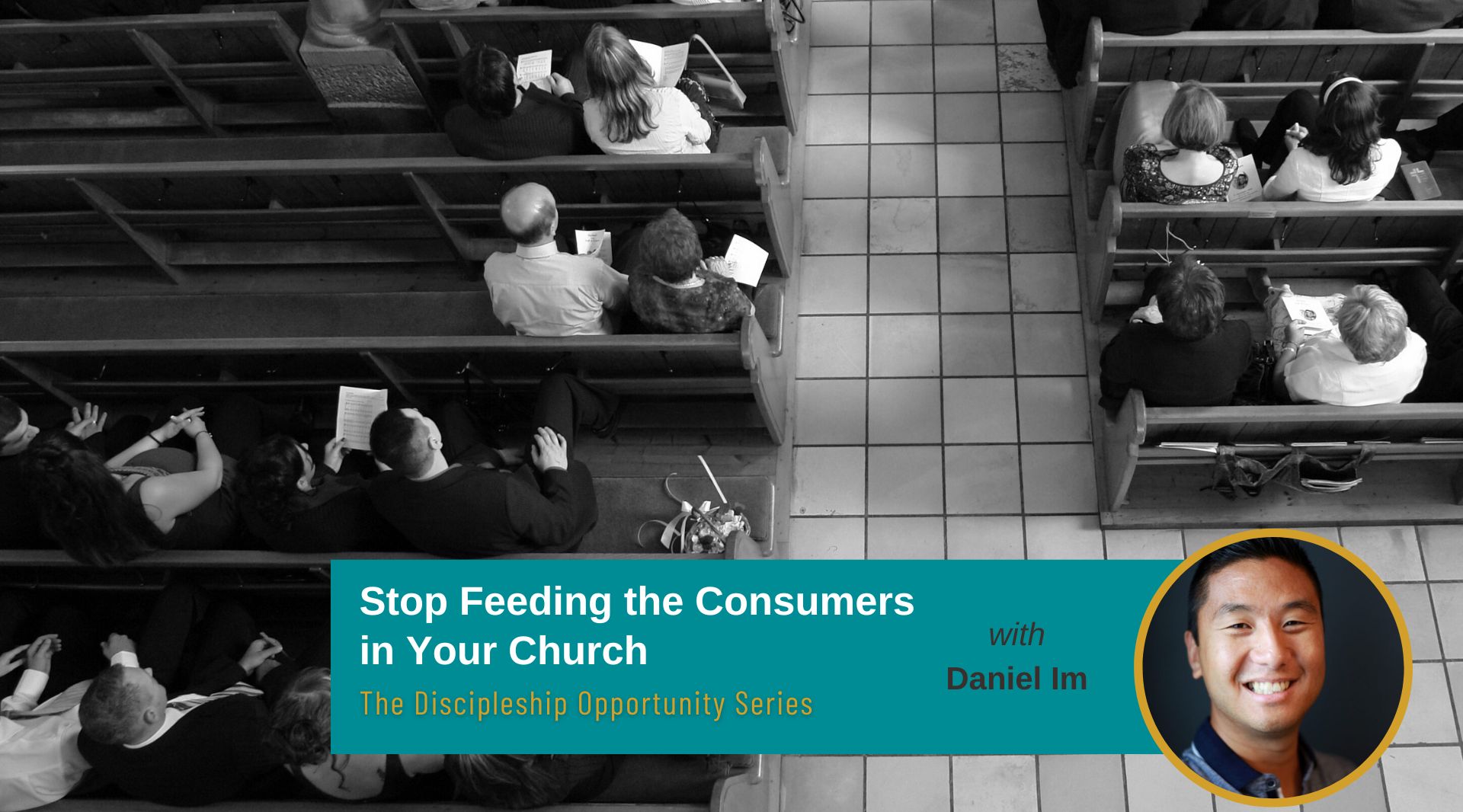This is the fourth post of a five-part series based on Pastor Daniel Im’s book, The Discipleship Opportunity: Leading a Great-Commission Church in a Post-Everything World. In his previous post, Daniel helped us understand the mindset of a “seeker”, and how to best walk alongside them. You can read it here. In this post, Daniel will talk about “consumers”—Christians who are more concerned with what they get out of church rather than how they can live out the gospel.
Jesus commissioned us to “go, therefore, and make disciples of all nations” (Matthew 28:19), not to please people who like to hold the church ransom with their tithes, time, gifts, and Google reviews. Jesus is the one who provides us with our daily bread. This is His church—His bride. And Jesus said that He would build His church, and the gates of hell would not overpower it.
In the past, many ministries, programs, and initiatives effectively got people into church and interested in Jesus. As a result, non-Christians became Christians and Christians learned a lot of information. These methods were great at gathering people together and growing them. Unfortunately, these same ministries, programs, and initiatives weren’t as effective at equipping disciples to make disciples. As I wrote in chapter 3 of The Discipleship Opportunity, there are ongoing steps that are necessary in a discipleship pathway. Gathering together, growing together, giving together, and going together are the four practices that we are called to embody to grow as disciples of Jesus and disciplemakers of others. If we think of these practices as exercise, then we need all of them to get a full-body workout. Gathering together and growing together are like working out your upper body—it’s where most of us start, and we like seeing progress with defined arms and greater upper-body strength. Giving together is like working out your core—no one likes doing it, but it helps the whole body with balance, posture, stability, and flexibility. And going together is like working out your lower body—if you neglect it, your foundation will be weak, and your body will be out of proportion.
Challenging Church Consumerism
You might be able to get away with an imbalanced workout routine for a short period of time, but if you overfocus on some areas while neglecting others, it’ll eventually catch up to you. Muscle imbalance can lead to physical issues, instability, and an increased risk of injury. In the same way, an imbalanced spiritual workout has its own set of consequences. For example, many of the ministries, programs, and initiatives that once got people into church and interested in Jesus are the same ones that helped produce consumeristic Christians. The program became the end rather than a means to the end of being a disciple of—and a disciplemaker for—Jesus. So instead of developing disciples who learned how to work out their whole bodies (and help others do the same), many of these programs overfocused on some areas while neglecting others, unintentionally producing consumers in the process.
Consumers might be great at gathering and growing but don’t know why they should give of their time, talent, and treasure in response to the great commission. These are like people who enjoy eating protein (“I want meat and depth”) but don’t want to do any of the workouts.
So what’s the solution? How do we disciple the consumers who are still in our churches today without feeding a consumeristic culture? It’s by creating a culture in our churches that will either starve them or sanctify them!
Through your church culture, make consumers uncomfortable by clarifying what it means to be a disciple—a disciple of Jesus isn’t a spectator or someone who prayed a prayer but someone who is following Jesus, being continually changed by Jesus, and joining Jesus in what He is doing in the world. Regularly remind everyone in your church that following Jesus isn’t a one-hour-per-week commitment but an everyday, all-of-life practice that happens as we intentionally gather, grow, give, and go with others. This is about creating opportunities in your discipleship pathway for people to gather, grow, give, and go together.
Giving and going should be emphasized as much as gathering and growing. Every small group in your church should either have a mission focus or see themselves as a group of missionaries. Next steps are a great way to empower and deploy people in your church who aren’t regularly giving and going with others. For example, a one-time initiative to clean up the playgrounds in your city or hand out ice-cold water bottles on a hot summer day are great ways to begin reminding the consumers in your church that following Jesus is about giving and going as much as it is about gathering and growing.
Changing the Paradigm
Some churches unintentionally create a “two-tier” paradigm that excuses “lightweight faith” and delegates all the responsibility to “serious Christians” or paid professionals. Your church culture can challenge this paradigm by emphasizing that the ground is flat at the foot of the cross and that everyone has the same primary calling to love God, love others, and make disciples—regardless of where someone might get their paycheck. An effective way to do this is through sharing stories during your weekend service and on social media—not stories from the pastor but from disciples in your church who are living this out. While consumers might expect pastors to talk about giving and going, their paradigm will be challenged when they hear stories from others in their church— others who are just like them. Lastly, clarify the impact that consumerism has on all of us, and how we are sometimes better disciples of consumerism than disciples of Jesus, as reflected in this chart.
As you cultivate a culture like this in your church, you will either starve or sanctify the consumers. They will either leave for somewhere else that will feed them the sort of consumeristic Christianity that they want, or they will feel the conviction of the Holy Spirit and repent. In either case, you are not responsible for their decision. You are responsible to teach them the truth, to show them how to follow Jesus faithfully, and to point out where they might be better disciples of consumerism than of Jesus, but you are not responsible for their decision and the consequences of their decision. There’s a big difference between being responsible for and being responsible to the people in your church, and we need to be mindful of that distinction. After all, we are prophets, not saviors. We are leaders, not enablers. We are stewards, not owners. And we are to be disciples, not consumers.

In our final post, we’ll learn about disciples—those who are committed to living out the gospel.

Daniel Im
is a pastor, Bible teacher, writer, and podcast host with a passion for the local church. He is the lead pastor of Beulah Alliance Church and the author of No Silver Bullets, Planning Missional Churches, and You Are What You Do: And Six Other Lies about Work, Life, and Love. He lives in Edmonton, Alberta with his wife Christina and their three children. For more information, visit danielim.com and connect with him on social media @danielsangi.


